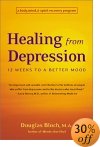The Power of Social Support in Coping With Depression
Social support is a key ingredient in dealing with emotional pain that goes along with chronic unremitting anxiety and depression.
My definition of a man is this: a being who can get used to anything."
Dostoyevsky
The title of my book is When Going Through Hell - Don't Stop! What do I mean by hell? I define it as "relentless physical or emotional pain that appears to have no end." This was my experience of living with chronic, unremitting anxiety and depression.
I found that the best way to cope with such intense discomfort was to live my life one day at a time. Whenever I contemplated the prospect of dealing with my pain over the long term, I became overwhelmed. But if I could reduce my life to a single 24-hour segment of time-that was something I could handle. If I could tread water (or, being in hell, tread fire) each day, then perhaps I could survive my ordeal.
Working together, my therapist and I created what I called "my daily survival plan for living in hell." The central idea was simple-to develop coping strategies that would get me through the day, hour by hour, minute by minute. Because I was fighting a war on two fronts, I had to devise and employ techniques that would deal with both the depression and the anxiety. I used my coping strategies to create four categories of support, which I have summarized on the following pages. These categories are: physical support, mental/emotional support, spiritual support, and most importantly, people support.
What follows is a brief outline of my daily survival plan. I have rewritten it in the second person so that you can adapt it to your individual needs. Remember, the goal is to identify coping strategies that will keep you safe and get you through each day until the pattern of the depression shifts.
A. People Support
 Social support is a key ingredient in dealing with emotional pain. Find a way to structure your daily routine so that you will be around people much of the time. If there is a day treatment program in your area, some form of group therapy, or depression support groups at your local hospital, attend them. Don't be embarrassed about asking for help from family members or friends. You are suffering from an illness, not a personal weakness or defect in character.
Social support is a key ingredient in dealing with emotional pain. Find a way to structure your daily routine so that you will be around people much of the time. If there is a day treatment program in your area, some form of group therapy, or depression support groups at your local hospital, attend them. Don't be embarrassed about asking for help from family members or friends. You are suffering from an illness, not a personal weakness or defect in character.
My own sense of connection with people gave me a reason not to harm myself. I did not want to afflict my friends and family with the anguish that would result from my self-imposed departure. A lifeguard at the pool where I swam, agreed with my thinking. "Other people are a good reason to stay alive," she affirmed.
Support is critical in helping people to cope with all kinds of extreme circumstances. Survivor researcher, Julius Siegal, emphasizes that communication among prisoners of war provides a lifeline for their survival. And for those who are prisoners of their inner wars, support is equally crucial. In chronicling his own depressive episode, novelist Andrew Solomon wrote:
Recovery depends enormously on support. The depressives I've met who have done the best were cushioned with love. Nothing taught me more about the love of my father and my friends than my own depression.
B. Physical Support
The second aspect of your daily survival plan consists of finding ways to nurture your physical body. Here are some suggestions.
-
Exercise: Research has shown that regular exercise can improve mood in cases of mild to moderate depression. Exercise is one of the best ways to elevate and stabilize mood as well as improve overall physical health. Pick an activity that you might enjoy, even if it is as simple as walking around the block, and engage in it as often as you can (three to four times a week is ideal).
-
Diet and Nutrition: Eat a diet that is high in complex carbohydrates and protein, avoiding foods such as simple sugars that can cause emotional ups and downs. Try to stay away from foods that have chemical additives or preservatives that may create ups and downs for chemically sensitive individuals.
-
Sleep: Adopt a regular sleep schedule to get your body into a routine. If you have trouble getting to sleep or suffer from insomnia, there are behavioral techniques as well as medication that can help you to sleep. The book "No More Sleepless Nights" by Peter Hauri is a good resource.
-
Medication: Take your antidepressant medication as prescribed. Check with your health care professional before making any changes in dosage. Be patient and give the medicine enough time to work.
C. Mental/Emotional Support
Every thought and feeling produces a neurochemical change in your brain. Although you may not always be able to control the painful symptoms of depression and anxiety, you can influence the way you think and feel about those symptoms.
-
Monitoring self-talk. Monitoring one's self-talk is an integral strategy of cognitive-behavioral therapy, a talk therapy widely used in treating depression. You may wish to work with a therapist who specializes in cognitive therapy. He or she can help you to replace thoughts of catastrophe and doom with affirmations that encourage you to apply present-moment coping strategies. For example, the statement "My depression will never get better" can be replaced by the affirmation "Nothing stays the same forever" or "This, too, will pass." Switching from negative to positive self-talk is a process that may have to practiced once, twice, sometimes ten times a day. Since the depressed brain tends to see life through dark-colored glasses, monitoring one's inner dialogue provides a lifeline to healing.
-
Keep a mood diary. One of the survival techniques I used to stay alive in my hell was to keep track of my anxiety and depression on a day-to-day basis. To this end, I created a daily mood scale. Somehow, the simple act of observing and recording moods gave me a sense of control over them. I also used the mood diary to track my reactions to pharmaceutical drugs and to record daily thoughts and feelings. Here is the scale that I used. Feel free to adapt it to your own needs.
Daily Mood Scale | |||
| Score 1-10 | Depression | Score 1-10 | Anxiety |
| 8 -10 | despair, suicidal feelings, | 8 - 10 | out-of-control behavior, hitting, rhyming voices |
| 6 - 7 | at the edge, feeling really bad | 6 - 7 | strong agitation, pacing |
| 5 | definite malaise, insomnia | 5 | moderate worry, physical agitation |
| 3 - 4 | depression slightly stronger | 3 - 4 | mild fear and worry |
| 1 - 2 | minorly depressed mood | 1 - 2 | slight fear and worry |
| 0 | absence of symptoms | 0 | absence of symptoms |
Clearly the goal is to be on the low end of the scale. The lower the number, the fewer the symptoms.
-
Be compassionate with yourself. As part of one's emotional self-care, it is important to release the toxic feelings of blame, guilt or shame that are so often felt by a person who is depressed. Try to remember that depression is an illness, like diabetes or heart disease. It is not caused by a personal weakness or a defect in character. It is not your fault that you have this disorder."
Once again you can turn to the affirmation process. Whenever you start to judge yourself for being depressed you can repeat, "It's not my fault that I am unwell. I am actually a powerful person residing inside a very sick body. I am taking good care of myself and will continue to do so until I get well."
-
Focus on the little things. In the middle of my episode I asked my therapist, if all I am doing is trying to survive from day to day, how do I find any quality to my life?"
"The quality is in the little things," she replied.
Whether it is a kind word from a friend, a sunny day, a beautiful sunset, or an unexpected break from the pain, see if you can take in and appreciate these small moments of grace. Having such moments is akin to making deposits into an "emotional bank account." When the dark periods return, you can draw upon these stored memories and affirm that life can still be beautiful, if only for an instant.
Above all, no matter how bad things seem, remember that nothing stays the same forever. Change is the only constant in the universe. One of the most powerful thoughts you can hold is the simple affirmation "This too, will pass."
D. Spiritual Support
If you believe in God, a Higher Power, or any benevolent spiritual presence, now is the time to make use of your faith. Attending a form of worship with other people can bring both spiritual and social support. If you have a spiritual advisor (rabbi, priest, minister, etc.), talk with that person as often as possible. Put your name on any prayer support list(s) you know of. Don't be bashful about asking others to pray for you. (A list of twenty-four hour telephone prayer ministries in provided for you in my section on prayer.) The universe longs to help you in your time of need.
Because of the disabling nature of depression, you may not be able to implement all of the strategies that I have presented. That is okay. Just do the best you can. Do not underestimate the power of intention. Your earnest desire to get well is a powerful force that can draw unexpected help and support to you-even when you are severely limited by a depressive illness.
 This page was adapted from the book, "Healing from Depression: 12 Weeks to a Better Mood: A Body, Mind, and Spirit Recovery Program", by Douglas Bloch, M.A.
This page was adapted from the book, "Healing from Depression: 12 Weeks to a Better Mood: A Body, Mind, and Spirit Recovery Program", by Douglas Bloch, M.A.
Bloch is an author, teacher and counselor who writes and speaks on the topics of psychology, healing and spirituality. He earned his B.A. in Psychology from New York University and an M.A. in Counseling from the University of Oregon.
Bloch is the author of ten books, including the inspirational self-help trilogy Words That Heal: Affirmations and Meditations for Daily Living; Listening to Your Inner Voice; and I Am With You Always, as well as the parenting book, Positive Self-Talk for Children.
next: Coping With Loss: Bereavement and Grief
~ depression library articles
~ all articles on depression
APA Reference
Staff, H.
(2008, December 26). The Power of Social Support in Coping With Depression, HealthyPlace. Retrieved
on 2024, April 18 from https://www.healthyplace.com/depression/articles/power-of-social-support-in-coping-with-depression



